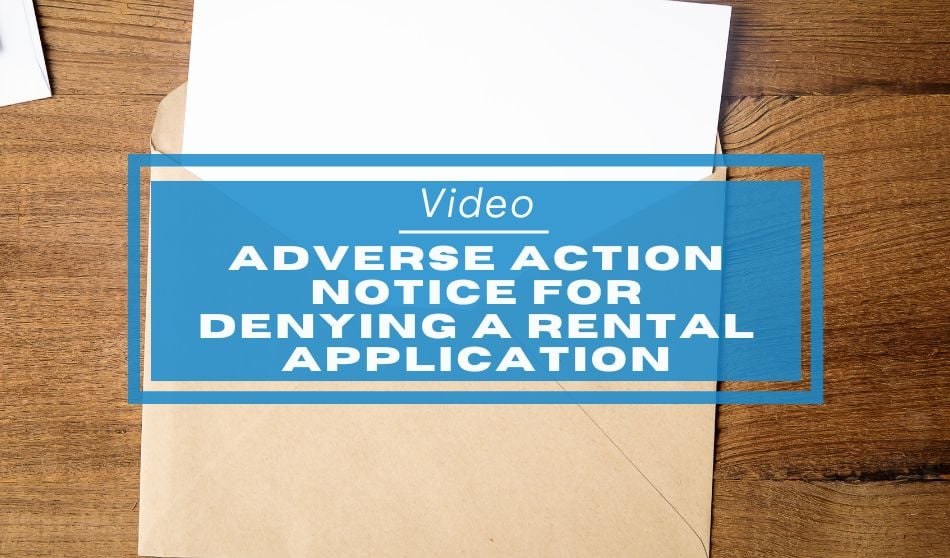
Landlords are required to provide an Adverse Action Notice to rental applicants if they are denied housing based on information found in a consumer report, like a credit report or criminal background report. Dive into what you need to know as a landlord or property manager in this video with Rentec Direct’s Kaycee Miller.
Denying a rental applicant? Before you move on to the next prospect, make sure you’re following the legal steps to protect yourself and stay compliant with federal housing laws and the Fair Credit Reporting Act (FCRA).
In this video, Kaycee Miller from Rentec Direct—landlord, investor, and rental industry expert—breaks down everything you need to know about adverse action letters, tenant screening reports, and how to avoid discrimination claims when denying housing applications.
You will learn:
- When an adverse action letter is required
- What to include in that letter to stay compliant
- Why using credit, criminal, or eviction reports matters
- How to handle multiple qualified applicants the right way
- Pro tips to avoid legal trouble as a housing provider
Adverse Action Notice for Denying a Rental Application – Watch the Video
Adverse Action Notice for Denying a Rental Application – VIDEO Transcript
Whether you’re a landlord or a property manager, this is must-know info to keep your rental business running smoothly and legally.
Are you looking for a new renter for your rental housing? And after reviewing some applicants, find one that you love. But what about some that maybe didn’t qualify for the rental housing or that don’t meet your rental criteria? How do you inform them and how do you ensure that you remain compliant with federal fair housing laws and the Fair Credit Reporting Act?
My name is Kaycee Miller. I work with Rentec Direct Property Management Software. I’m also a landlord, a real estate investor, and I’ve been writing about rental related topics for over a decade on the Rentec direct blog. Today we’re gonna talk about how to legally deny a rental applicant after you perform tenant screening for your rental property.
Federal Compliance and Best Practices
Now, when it comes to denying a rental applicant, it’s really important that you follow best practices and stay compliant with federal regulations in terms of how you inform a rental applicant if they’ve been denied rental housing with one of your properties.
When You Use Consumer Reports
If you use any consumer report, like a credit report, a criminal background report, an eviction history report, and you make a denial based on information in that report, you must provide an adverse action letter to that rental applicant. In an adverse action letter, you’re gonna provide information stating that you have denied them rental housing or that they weren’t approved of that rental housing. You also need to say to that it may be due to some information in their consumer report. And then provide the information, including the name and the address and the contact information for the consumer reporting agency that you use. Think like Experian, Equifax. And then you also need to inform them that they are entitled to access a copy of that report based on the contact information that you provide. And that is one of the best ways that you can remain compliant with those federal fair housing laws.
Learn more: Legal Requirements for Denying a Rental Applicant (Adverse Action Letter)
Avoiding Discrimination Claims
Another thing that’s important about an adverse action letter is that it can help you avoid discrimination claims because you are clearly stating that the rental applicant did not meet your rental criteria based on information that was found in some of these consumer reports. Perhaps they didn’t have the appropriate credit score or their debt to income ratio doesn’t meet your rent income requirements, or they have their criminal background shows a conviction for a violent crime that would make them dangerous to live at your property or their eviction history report shows that they have a history of past evictions and you live in a state where you can use that information to make a screening decision. So making sure that you legally inform a rental applicant that they have been approved or denied, and if they’re denied, providing them with an adverse action letter that follows the legal requirements is one of your obligations as a housing provider, either as a landlord or a property manager.
When Adverse Action Letters May Not Be Required
Now, if you denied them housing because they didn’t meet one of your other rental criteria, like their income didn’t meet your threat threshold or they had a bad landlord reference, you might not have to provide them with an adverse action letter. But if you still poll consumer reports and access them and then also made a housing decision based on some other information, it’s still a good idea to provide those adverse action letters to them because you are acknowledging the fact that you pulled consumer reports, you’re acknowledging that they didn’t meet the criteria to live at your housing, meet the rental housing criteria that you established, and you can give them information about what it was that had you deny them or you can keep it pretty general and just say you didn’t get approved for this property.
Handling Multiple Qualified Applicants
Now, sometimes it happens where you have a bunch of rental applicants, a lot of them are qualified, and you pick one to live in your property, best practices to meet, pick the first qualified applicant that will meet the rental criteria, and then you can maintain those um, approved rental applications for perhaps another property that’s in your portfolio.
Conditional Approvals for Future Properties
So that’s a way to still provide housing to these uh, applicants who might be conditionally approved based on your down standing housing criteria, if there’s another property that they might qualify for.
Final Thoughts
Hopefully that gives you some good information about the basics of when and how you need to provide an adverse action letter. When you deny rental housing based on information you find in a consumer report, like a criminal background check, a credit report, and our eviction history report.
My name is Kaycee. I work with Rentec Direct Property Management software. You can always find more great tips about how to be a great landlord, best practices for property management, and how to maintain that landlord-tenant relationship on the Rentec Direct blog. Follow me there.
Disclaimer: The information and content in this video is not prepared or reviewed by an attorney and the information provided in this content is for educational purposes only. It should not be considered legal advice. For legal guidance specific to your situation, please consult a qualified attorney or legal professional.





